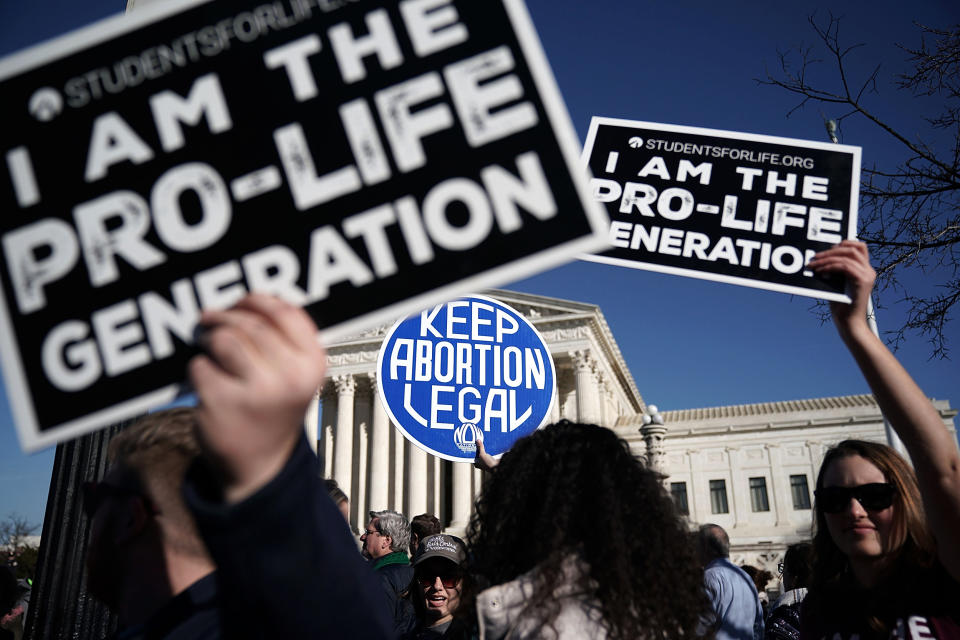Anti-abortion rights movement paid 'Jane Roe' thousands to switch sides, documentary reveals
Norma McCorvey was unmarried and unemployed when she became pregnant for the third time at age 22. It was 1969, and it was illegal to have an abortion in Texas, where she lived. McCorvey resorted to seeing an underground abortion doctor but walked out because of the "filth and cockroaches."
Soon after, McCorvey became a national symbol for the abortion rights movement. For years she was known simply as Jane Roe, the plaintiff from one of the most famous Supreme Court cases in history: Roe v. Wade.
In 1995, McCorvey returned to the national spotlight as an evangelical Christian and a vocal opponent of abortion rights. Her religious conversion, however, may not have been fueled by faith but instead by opportunity. McCorvey was paid hundreds of thousands of dollars by Operation Rescue, now known as Operation Save America, according to a documentary premiering Friday on FX and Saturday on Hulu. The modern Operation Rescue is a different organization opposing abortion rights.
Directed by Nick Sweeney, the film, "AKA Jane Roe," traces McCorvey's dramatic journey from pro-abortion rights hero to anti-abortion rights advocate and back again, framing her as a mercenary who wanted to make amends through a "death bed confession."
"I was the big fish," McCorvey says in the documentary. "I think it was a mutual thing. I took their money, and they put me out in front of the cameras and told me what to say, and that's what I'd say."
The bombshell revelation is supported throughout the film by statements from two religious leaders who worked closely with McCorvey.
"What we did with Norma was highly unethical. The jig is up," says the Rev. Rob Schenck, who says he wants to set the record straight by publicly admitting for the first time that McCorvey was paid to pose as an anti-abortion rights activist.
"I knew what we were doing, and there were times I wondered, 'Is she playing us?' And what I didn't have the guts to say was 'because I know damn well we were playing her,'" says Schenck, who is now the president of the Dietrich Bonhoeffer Institute, a Washington-based think tank. Schenck wrote in The New York Times last year that he now opposes overturning Roe v. Wade.
In 2017, McCorvey died at an assisted living center in Katy, Texas, of heart failure. She was 69. "AKA Jane Roe" was filmed during the last year of her life, painting an intimate portrait of a complicated figure whose actions changed the course of history.

The Supreme Court's 1973 decision, which made abortion legal in all 50 states, remains one of the most divisive precedents in recent history.
Throughout her public life, McCorvey vacillated between supporting abortion rights and denouncing them. She never had an abortion, but she gave up at least two children to adoption. McCorvey's firstborn, a daughter conceived during McCorvey's marriage at 16, was raised mostly by the girl's grandparents.
McCorvey described her early years as "rough."
"It was always survival," she says in "AKA Jane Roe."
McCorvey ran away from her native Louisiana with another young girl when she was around 10 years old. The two were arrested after they admitted kissing. McCorvey was sent to reform school and said she was later sexually abused by a male relative. She married a man and said she had a decades-long romance with Connie Gonzalez. She renounced the partnership after becoming a born-again Christian in 1995.
Cajoling McCorvey to get baptized was a big victory for abortion rights opponents, who branded her as the poster child of a reformed sinner.
"When she jumped from a child of Satan to a child of God, it just turned everything in this world upside down," the Rev. Flip Benham, an evangelical Christian minister and former director of Operation Save America, says in "AKA Jane Roe."
Download the NBC News app for breaking news and politics
But McCorvey's story always included more than a few inconsistencies, according to the film. When she joined the Roe v. Wade litigation, McCorvey claimed that she had been raped and became pregnant as a result. In the 1980s, she rescinded the claim in a televised interview, saying she had never been raped.
"I know how I felt when I found out that I was pregnant, and I wasn't going to let another woman feel that way — cheap, dirty and no good," McCorvey says through tears in the film. "Women make mistakes, and they make mistakes with men, and things happen. It's just Mother Nature at work."
McCorvey's confession made her somewhat of a pariah in the abortion rights movement. After McCorvey fell out of favor, she slipped into anonymity until she resurfaced in the 1990s as a devout Christian. She apologized publicly for her role in helping to bring about access to legal abortion.
"I thought I was doing something right," she said during a 1996 memorial service for unborn children. "I didn't realize I would be leading innocent children to a senseless and terrible death."
However, in her final year of life, McCorvey offered an unfiltered take on legal abortion.
"If a young woman wants to have an abortion, fine. It's no skin off my ass," she says in the documentary. "That's why they call it choice. It's your choice."

